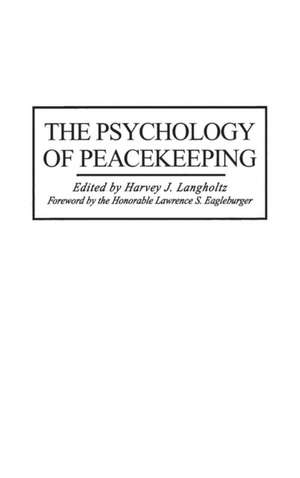The Psychology of Peacekeeping
Autor Harvey Langholtzen Limba Engleză Hardback – 26 aug 1998 – vârsta până la 17 ani
Preț: 439.51 lei
Preț vechi: 605.19 lei
-27% Nou
Puncte Express: 659
Preț estimativ în valută:
84.13€ • 91.41$ • 70.71£
84.13€ • 91.41$ • 70.71£
Carte tipărită la comandă
Livrare economică 21 aprilie-05 mai
Preluare comenzi: 021 569.72.76
Specificații
ISBN-13: 9780275962326
ISBN-10: 0275962326
Pagini: 280
Dimensiuni: 156 x 235 x 27 mm
Greutate: 0.61 kg
Editura: Bloomsbury Publishing
Colecția Praeger
Locul publicării:New York, United States
ISBN-10: 0275962326
Pagini: 280
Dimensiuni: 156 x 235 x 27 mm
Greutate: 0.61 kg
Editura: Bloomsbury Publishing
Colecția Praeger
Locul publicării:New York, United States
Notă biografică
HARVEY J. LANGHOLTZ is Assistant Professor of Psychology at The College of William and Mary in Williamsburg, Virginia. He has served as a member of the United States Delegation to the United Nations and has been appointed a Senior Special Fellow of the United Nations Institute for Training and Research.
Cuprins
Foreword by the Honorable Lawrence S. EagleburgerIntroduction by Harvey J. LangholtzPrevention: Psychological and Social Issues That Can Avert or Lead to WarThe Evolving Psychology of Peacekeeping by Harvey J. LangholtzPeace through Economic and Social Development by Claudia González-Vallejo and Giselda Barroso SauveurEarly Intervention: Prediction and Action by Ervin StaubThe Psychology of Diplomacy: Conflict Resolution in a Time of Minimal or Unusual Small-Scale Conflicts by Ambassador Edward J. PerkinsCultural and Ethnic Issues of Conflict and Peacekeeping by Paul R. KimmelPsychological Considerations during Periods of ConflictInsensitivity to the Value of Human Life: A Study of Psychophysical Numbing by David Fetherstonhaugh, Paul Slovic, Stephen M. Johnson, and James FriedrichPersonnel Selection and Preparation for U.N. Peacekeeping Missions by Brian Kidwell and Harvey J. LangholtzPsychological Aspects of Peacekeeping on the Ground by Christian HarlemanPsychological Ambiguities in Peacekeeping by Thomas W. BrittPsychological Aspects and Confidence-Building Measures in the Transition from Violence to a Durable PeaceHumanitarian Intervention, Psychosocial Assistance, and Peacekeeping by Michael G. WessellsPeacekeeping and the Psychology of Conflict Resolution by Tom WoodhouseCreating a Durable Peace: Psychological Aspects of Rebuilding and Reforming the Indigenous Criminal Justice System by J. Matthew VaccaroThe Psychological Consequences of Mines Left Behind Following a Conflict by Barry Cox and Harvey J. LangholtzPostconflict Peacebuilding and Making Efforts Count: Reconstruction, Elections, and Beyond by Valeria M. Gonzalez PosseForgiveness, Reconciliation, and the Contribution of International Peacekeeping by Eileen Borris and Paul F. DiehlThe Peace Process at Its Culmination: The Reconciliation Elections by Fabrizio PaganiTreating the New World Disorder by Henry BreedIndex









